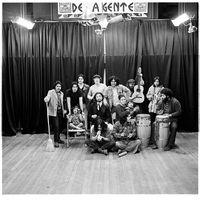-
Title
-
The California Chicano Cultural Movement: The Chicano Music and Literary Movements
-
Description
-
The Chicano Music Movement
San José-based Flor del Pueblo was one of the most influential musical ensembles of the Chicana/o Movement, and inspired activism for social justice with local roots and an international perspective. Formed in the 1970s, they performed with various South Bay Teatro Chicano groups — including El Teatro Campesino — and were on stage at the Chicano Moratorium on August 29, 1970, when police violence broke up a peaceful demonstration. Their 1977 album, Música de Nuestra América, incorporated Latin American protest music influences on Chicana/o Movement musical style.
Chicano Literary Movement
The Chicano community was rediscovering the power of literature to communicate philosophies and experiences and inspire change. The poem “I am Joaquin,” written in 1967 by Chicano Nationalist leader Corky Gonzalez, was significant as an anthem for the Chicano Civil Rights Movement and was soon adapted into a short film directed by Luís Váldez. The poem reflects on the complicated relationship of Chicanos to America, with a heritage that incorporates Spanish, Aztec, American Indian, and European American sources. While fighting for integrated schools and equal access to education, the Chicano Civil Rights Movement strongly supported bilingual education, which was illegal in many states at the time.
A long history of colonization had created a rich oral tradition of storytelling, plays, and narrative songs called corridos. Indigenous oral traditions provided a way to express discontent with racial discrimination and envision an alternative future. A powerful voice among Chicana writers is poet and publisher Lorna Dee Cervantes. Born in San Francisco and raised in downtown San José, she started writing poetry as a teenager and was determined that her words would be accessible to readers like herself. In 1976, Cervantes founded MANGO Publications, the first to publish many famous Chicano writers, including Sandra Cisneros, Jimmy Santiago Baca, and Alberto Rios.
Numerous Chicano newspapers, activist organization newsletters, and scholarly and arts publications arose during this period. These included papers such as El Manchete, Bronce and La Palabra, and Que Tal, a student newspaper. While some were short lived, they documented the concerns of diverse ethnic Mexican communities and interpreted the goals of the Chicano Civil Rights Movement for their audiences. The Chicano Press Association, established in 1969, had twenty two members at its height, mostly in California. Quinto Sol of Berkeley, the first fully independent publishing house, was founded in 1967 at UC Berkeley by Octavio I. Romano. They published the interdisciplinary El Grito: A Journal of Contemporary Mexican-American Thought, the first national academic and literary journal ever published in the United States.
-
Identifier
-
B4SV Exhibit Topic Six: Slide 020
 Teatro De La Gente
Teatro De La Gente 
